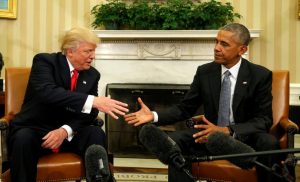(Akiit.com) “And I think that if Donald Trump is re-elected, and in the second term, maybe a reporter ends up in jail, maybe one of those investigators being investigated for the third time now ends up in jail,” said Nicolle Wallace, who plays a journalist on MSNBC.
The beauty of reporting for a network like MSNBC – or just about every other network for that matter – is that you address an audience that was spared just about all news of presidential mischief from 2008 to 2016.
There was much such mischief to overlook, especially in President Obama’s genuinely paranoid relationship with the media.
In May 2013, nearly three years to the day after Obama signed the Freedom of Press Law, the illusion of an unfettered press disappeared like a magician’s bunny.
It was in this month that the Associated Press learned Obama’s Justice Department had quietly seized all of the relevant records for 20 AP telephone lines a year earlier.
These included the personal and professional lines of several reporters. The seizure had to do with AP reporting on a covert CIA operation in Yemen.
Although only five reporters were involved in that story, more than one hundred reporters used the lines and switchboards whose records were seized. AP President Gary Pruitt wrote Attorney General Eric Holder that the “government has no conceivable right to know” the content of those records.
On “Face the Nation,” Pruitt boldly assessed White House strategy: “I know what the message being sent is: If you talk to the press, we’re going after you.”
With the New York Times in its corner, the Obama White House felt free to blow the AP off. DOJ attorneys went behind the AP’s back, failed to negotiate the scope of the subpoena with the AP and refused to explain what threat to the integrity of the investigation made the subterfuge necessary.
An even more disturbing story broke a week later. It seemed that for the prior three years, the DOJ had been secretly dipping into the personal and professional communications of Fox News Washington correspondent James Rosen.
The case involved Rosen’s interactions with a State Department contractor monitoring North Korea’s nuclear program. What troubled at least a few in the media community was the DOJ’s use of search warrants to investigate a reporter and the threat to prosecute him under the terms of Espionage Act as an “as an aider, abettor and/or co-conspirator.”
“Search warrants like these have a severe chilling effect on the free flow of important information to the public,” First Amendment lawyer Charles Tobin told the Washington Post. “That’s a very dangerous road to go down.”
Obama boldly claimed he would “make no apologies” for investigating national security leaks that threatened the American military, but the probes dug much deeper than “national security.”
In June 2013, the McClatchy newspapers broke the story of an “unprecedented” Obama administration initiative launched in 2011 in the wake of the Bradley Manning leaks.
Much like Nixon’s “plumbers,” the operatives of “Insider Threat Program” (as it was known) worked to suppress leaks in the national security agencies.
Unlike the plumbers, however, the Insider Threat people extended their mission into the seemingly benign regions of education, agriculture and social security.
Scarier still, in the Maoist spirit of the Obama administration, everyone was expected to plumb. The administration obligated employees to turn themselves and their co-workers in for failing to report leaks.
Specifically, the program’s strategic plan mandated supervisors to “penalize clearly identifiable failures to report security infractions and violations, including any lack of self-reporting.”
All that the Internal Threat Program managed to do, of course, was to discourage employees from reporting routine waste and corruption.
“You don’t get people speaking up when there’s wrongdoing,” said former CIA case officer Liana Greenstein. “What you get are people who toe the party line, and that’s really dangerous for national security.”
Perhaps most of all, the Internal Threat Program discouraged disgruntled employees from talking to the media. “The suspicion has to be that maybe these ‘leak’ investigations are less about deterring leakers and more about intimidating the press,” opined the Wall Street Journal.
Liberal First Amendment lawyer James Goodale was harsher still. In a Times op-ed, Goodale declared that “President Obama will surely pass President Richard Nixon as the worst president ever on issues of national security and press freedom.”
In liberal circles the Nixon comparison was very nearly as damning as a Hitler one. Ouch! Unlike Richard Nixon, who had good reason to distrust the media, Obama had no apparent motive for his secrecy other than that it gave him the space to do as he pleased and get away with it.
“They feel entitled to and expect supportive media coverage,” admitted veteran correspondent Josh Meyer in speaking of the White House press office.
For all the love that the media showered on the Obama administration, what they got in return, said Meyer, was “across-the-board hostility.”
In the age of Obama, however, many in the media had a hard time holding a grudge, and Obama knew it. Weeks after the Rosen story broke, the president made what the New York Times called a “ringing affirmation of press freedom.”
The Times reported that Obama was “troubled” by the revelations of DOJ mischief and that the DOJ’s Eric Holder – take out those hankies – “shared those concerns.”
The Times summarized the speech with the redemptive headline: “Obama, Offering Support for Press Freedom, Orders Review of Leak Investigations.”
As they say, an outrage only becomes a scandal when the New York Times calls it a “scandal” on the front page. When all was said and done, it was the suck-ups at the Times who made sure Obama enjoyed a famously “scandal-free” presidency.
Columnist; Jack Cashill
Official website; https://twitter.com/jackcashill









Leave a Reply